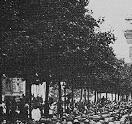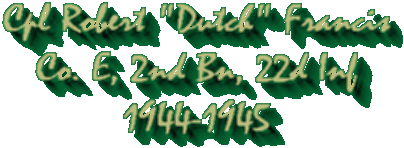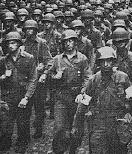| |
For
a 19 year old from Winnetka, Illinois in the 1940s,
the idea of heading off to war to defend his country seemed the noblest,
greatest,and most adult undertaking possible. It was a different time then:
a time when we trusted and respected our politicians; a time when we didn't
question their call to arms; a time when we were proud to put our lives
and our backs behind the all-too-real cause of stopping the spread of true
evil in the world. There was no media to show us boys being blown to bits
by land mines or cut to shreds by machine guns. The war was only seen on
the big screen, where everyone was a hero and the leading man always lived
on to win the good fight.
That's how I saw it
then, as I marched down to the enlistment center with my best friend Charlie
Siwocki in the October chill of 1943. Within 4 months, I was on my way to
England to join up with the 22nd Infantry Regiment in the 4th Infantry Division.
Charlie on the other hand, filed off to the Pacific with his Marine detachment.
Two kids, leaving for war together, heading opposite ways to fight for our
nation.
I spent my 20th birthday
(February 29, 1944) in England, training for what was eventually to be the
D-Day invasion, although we didn't know it then. I became pretty much a
loner in my unit, though. I think the anxiety building in me to get out
to what I thought was going to be the war was eating me up inside. I was
surrounded by a mix of guys fresh from the States and veterans who had seen
their buddies die by the dozens in places like Messina and Anzio. I felt
distant from both groups, became kind of a problem soldier, even got busted
back down to Private.
D-Day: Utah Beach
I would get my wish
to be part of the action soon enough. In late May, after months of hard
training, we got our orders for what was to become the D-Day landings in
Normandy. My battalion, 2/22 -- The Triple Deuces -- was to land just hours
after the initial assault on Utah Beach. As apprehensive as we were about
being among the first few waves on enemy shores, our hearts went out to
the 3rd battalion, who were one of the initial landing groups heading into
the unknown.
There was not much sleep
for any of us in early June, and we were in sad shape when we sailed through
the evening of 5 June 1944. By the time we boarded the LSTs to head for
shore in the dawn of 6 June, we had heard nothing of the groups that had
departed hours before us to clear the beaches, nor had we any word of the
paratroopers dropped in the night before to soften the positions. At that
point, all my desire to get in the action had evaporated. Men were throwing
up left and right from the anxiety and the seasickness. All I could do was
to focus on the rifle in my hand and pray that if there were any Germans
left on that beach, that their shots would go awry.
As it turned out, Utah
Beach was as much of a cakewalk as we could have hoped. Even the first landing
group met with limited resistance, and by the time we hit the beaches at
0800 D-Day things were clear and it was a quick progression out of the crafts,
onto the beach, and up into the hedgerows.
If you have seen Saving
Private Ryan (which is a must see), you'll see how lucky we were at
Utah. The movie accurately shows how some of our boys were chewed up by
German machine guns and artillery trying to get ashore at Omaha. I must
admit, I was terrified hitting the beach. Even though there were no Germans
in sight and no immediate danger nearby, artillery shells and the distant
sounds of gunfire are enough to send even the toughest new soldier trembling
just a bit.
Utah was not a problem
for us in terms of the enemy, but logistically it was a mess. We made our
rally points quickly but had no real direction where to go from there. Most
of us sat smoking apprehensively, or trying to spy a glance of General Teddy
Roosevelt who was directing things from the landing sites. By noon, we were
aggressively heading northwest into the mass of fields and hedgerows that
was Northern France without having seen a single German.
We had advanced perhaps
1/2 mile inland when we encountered the enemy for the first time, other
than a few minutes of "duck and cover" shelling. If you've never experienced
this before, I can't explain it to you. The fear of death and direct combat
with another human being looking to kill you, even if on the other side
of a mound of dirt and hedge does something to your mind and body that you
do not forget. We fired wildly at first, then more directly and succeeded
in driving back the small platoon of Germans that stood in the way of our
advance on Quineville.
Sleep that night was
troubled and not fitful. The stresses of combat had exhausted us all but
the nerves were still on edge, especially for those of us who had not seen
combat before. I still recall distinctly lying under the night sky looking
up through broken clouds and realizing that I was sleeping on land that
24 hours earlier had been part of the hated Nazi empire. I truly was a long
way from Illinois.
My First Weeks
At War
The next few weeks would
find us struggling to become battle hardened soldiers. All our personal
dislikes for one another faded as we came together to fight a common enemy.
I found myself protecting the lives of men I previously had no love for
as if they were part of my family. Sleep was something you got when you
could, and was often interrupted by the distant sounds of shelling or a
perceived snap nearby that could be the enemy. As a result, we were all
on raw nerves.
During our first week
in France, our objective was a small fortress like town named Azeville --
strategically located on the ridge line from Quineville that some general
thought we must occupy at all costs. While our first 2 days were deceptively
calm, by June 8th we were in heated battles with German troops intent on
holding Azeville.
It was both exhilirating
and terrifying, but never until later. During battle, we had no time to
think, only to react and do what we needed to either advance or save ourselves
and others. For two days we assaulted heavily armed and fortified German
positions, seeing our friends wounded and killed for the first time. Finally,
through half brilliant assault and half miracle, the German positions were
overrun and surrendered. Our first real victory!
It was shortlived as
several days later, we were once again pressed onward through the gap in
German defenses towards the goal of Quineville, our new objective. We found
ourselves again attacking fortified positions, attempting to take hills
in the face of heavy fire, with only our brief training and our hardened
leaders to push us on. Quineville bolstered our confidence again though,
as our battalion drove the Germans from several key points on the ridge
over the town. The burst of adrenaline from victory had become almost contagious
for us and I found myself longing to head back into battle again.
After the capture of
the town, our battalion fell into reserve duty for a while. And it gave
us time to relax and think about what we had been through. This was both
good and bad. Some of my fondest war memories come from this weeklong stretch
of time where it was almost possible to believe there wasn't a war going
on 20 kilometers away. We occupied the area in and around Quineville and
spent our time on patrols and being spoiled by the few French villagers
who hadn't fled. The ego boost for young 20 year old Dutch Francis from
Illinois to be treated like a conquering hero was amazing. I still can play
back in my mind, sitting next to a farmhouse outside the town with some
old villagers listening to "Les Deux Rengaines" by Edith Piaf and smoking
together as if it were the most natural thing in the world for us American
boys to be best of friends with French farmers. Edith Piaf seemed to be
playing everywhere in France, so this is my background music for this page:
the only song of hers I could find "La Vie En Rose".
The short term goal
of the Army was the city of Cherbourg, located nearly 100 kilometers away
at the top of the peninsula on which we landed. The next month found us
fighting our way north through resistance that seemed at times non-existant
and at times invincible. I was excited to be part of the liberation of
a city, but instead we fought to the east of the city, keeping open our
supply and reinforcement lines and, eventually, to take the airfield there.
I was already growing weary of battle, of seeing men who I trusted gunned
down as they charged dug-in defensive positions, but all in all, we had
it a lot lighter than a lot of the units there did. So I gutted it out
and thought to the breaks in fighting that made it all tolerable. Within
a month of being in France, we had cleared the peninsula north to Cherbourg
of German resistance and were ready to turn towards Paris.
Riding
Into Paris
The
trip south to meet our fellow GIs driving the jerrys back southward was
a welcome rest from the weeks of hard fighting on the peninsula. We rode
like conquering heroes through lands that had been occupied by the Nazis
just a month before, racing forward to keep up with the breakneck speed
of our advancing armor.
|


